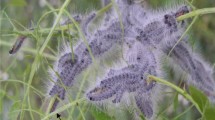Abstract
IT has been shown that robust green leaves which have ceased growth and not yet entered upon senescence are unsuitable, by comparison with growing or senescing leaves, for colonization by Aphis fabæ Scopoli and Myzus persicæ (Sulzer)1–3. Abnormally extended growth or premature senescence-like changes, or both, are characteristic of both the ‘pseudo-galls’ (curling and pocketing of leaves) and the virus diseases which plants can develop as a result of aphid attack. Experiments were therefore undertaken to see whether such pathological changes in the plants might not be beneficial to the aphids initiating them.
Similar content being viewed by others
References
Kennedy, J. S., Ibbotson, A., and Booth, C. O., Ann. App. Biol., 37, 651 (1950).
Ibbotson, A., and Kennedy, J. S., Ann. App. Biol., 37, 680 (1950).
Kennedy, J. S., and Booth, C. O., Ann. App. Biol., 38, 25 (1951).
Author information
Authors and Affiliations
Rights and permissions
About this article
Cite this article
KENNEDY, J. Benefits to Aphids from Feeding on Galled and Virus-infected Leaves. Nature 168, 825–826 (1951). https://doi.org/10.1038/168825a0
Issue Date:
DOI: https://doi.org/10.1038/168825a0
- Springer Nature Limited
This article is cited by
-
Research progress in the interactions of fungal pathogens and insect pests during host plant colonization
Journal of Plant Diseases and Protection (2021)
-
Effect of Cotton leaf curl virus infected plants on the biology of the whitefly, Bemisia tabaci (Hemiptera: Aleyrodidae): Vector–virus mutualism
Phytoparasitica (2014)
-
Virus strains differentially induce plant susceptibility to aphid vectors and chewing herbivores
Oecologia (2014)
-
Plant viruses alter insect behavior to enhance their spread
Scientific Reports (2012)
-
Population biology and epidemiology of plant virus epidemics: from tripartite to tritrophic interactions
European Journal of Plant Pathology (2012)





